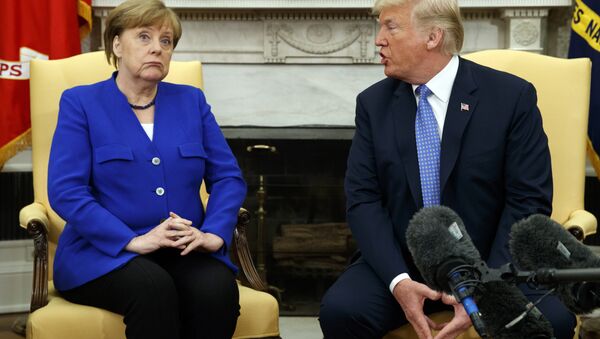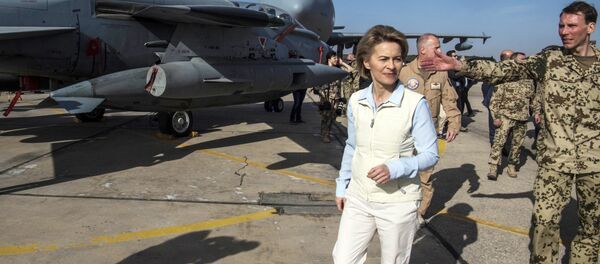"Donald Trump's meeting with Angela Merkel came under the slogan 'Don't give Trump a thing', something that was confirmed by the disappointed tone of US media," Sputnik contributor Ivan Danilov wrote in his commentary.
According to him, from a pragmatic point of view, Trump needed to get a slew of concessions from Merkel, namely, her go-ahead for new anti-Iranian sanctions, an increase in Germany's financial contributions to the NATO budget and support for Washington's trade war with China.
READ MORE: Germany Warns Against EU-US Trade War, as 'Transatlantic Relations Are at Stake'
"In terms of the talks' results, Trump has nothing to write home about because Merkel brought to [talks in] Washington a polite refusal related to all three points. Judging from the final press conference, she had no choice, given that meeting Trump's requirements was absolutely impossible for domestic political reasons," Danilov pointed out.
On the Iran nuclear deal, he recalled that during the talks, Merkel agreed that the agreement is "anything but perfect – it will not solve all the problems with Iran." But at the same time, she stated that the deal was an important part of the mosaic and a first step towards reducing nuclear activities and controlling them.
READ MORE: Germany Warns US Against Attempts to 'Divide Europe' That 'Won't Succeed'
Danilov wrote that Merkel's apparent unwillingness to withdraw from the Iran nuclear deal, also known as the Joint Comprehensive Plan of Action (JCPOA) actually means that "Germany is against the introduction of new anti-Iranian sanctions because they run counter to the obligations undertaken by JCPOA signatories."
Discussing the issue of financing the US military-industrial complex from the German budget was another flop for Trump during the Washington talks, according to Danilov.
He explained that the American side currently wants Germany to invest about 73 billion dollars in NATO annually, in line with Trump's demands.
READ MORE: Iran Deal: Trump 'Acts on Orders From Israeli Lobby in Washington' — Analyst
"The problem is that Merkel has already signed a coalition agreement in which nothing of the sort is envisaged, and there are no chances for changing the deal even if Washington demands it. An additional problem is that right under Washington's nose, Germany organized sort of a prototype of a 'parallel European NATO' without the US and Britain, something that can only be financed from Germany's defense budget," Danilov underlined.
As for tariffs wars between the US and the EU, as well as the US-China trade war, Danilov recalled that Trump had failed to achieve the surrender of both French President Emmanuel Macron and Merkel in this respect.
READ MORE: ‘Not a Question of Arguments’: Merkel, Macron Can’t Get Trump to Save Iran Deal
"The only 'success' is that none of these European leaders could persuade the US President to abandon the very idea of a trans-Atlantic trade war. But this is clearly not the result that could satisfy Trump and those who still believe in American hegemony," Danilov underscored.
Danilov concluded by predicting that "regardless of how diplomatic and economic conflicts between the two sides of the Atlantic will end, one can safely say that further interaction between the US and the EU will be increasingly conflict-ridden.
The views and opinions expressed by Ivan Danilov are those of the Sputnik contributor and do not necessarily reflect those of Sputnik.




